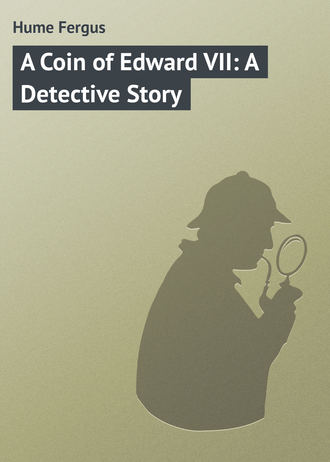
A Coin of Edward VII: A Detective Story
"You did not know that at the time?" said Giles breathlessly.
"No. Certainly I did not, or I should have sent the girl away. I am only talking by the light of recent events. When that man came to tell Morley about the death of Powell he knew that Daisy would leave the house and marry you as soon as she got the fortune. He tried to induce Denham when he was in the library to kill Daisy, and took down the stiletto for that purpose. Denham refused. Then there was a man called Dane, who came with a message. Morley asked him likewise to kill the girl, and was likewise refused. He saw there was nothing for it but to murder Daisy himself. In a day or so it would have been too late, as she would hear about the money and leave the house. Morley took the stiletto and went to the church in the hope of killing her when she came out and was amidst the crowd of people. He hoped to escape unobserved."
"A rash idea!" observed Giles.
"Oh, its safety lay in its rashness," said the widow coldly. "Well, it happened that Denham lured Daisy out of the church and did not follow for some time. Morley looking at the door saw her come out. She waited for a moment and then walked to her father's grave. Morley followed and killed her by stabbing her in the back as she knelt in the snow by the grave. She fell forward with a cry. He would have repeated the blow but that he saw Denham coming. He fled back to the house. I was in the library when he arrived. He made some excuse, and I never thought anything was wrong."
"Had he the stiletto with him?"
"I believe he had, but I did not see it. Afterwards he took the stiletto back to the churchyard and pretended to find it, so that Anne might be accused. Denham never suspected Morley of the crime. Why, I don't know, as any one who knew what I have told you about his offers to Denham and Dane must have guessed that Morley was guilty."
"How did you learn all this?" asked Giles, glancing at the confession which was in Morley's own handwriting.
"At various times. I did not suspect him at first. But one thing led to another and I watched him. I got at his papers and discovered all about the Scarlet Cross, and – "
"Wait, Mrs. Morley – I mean Warton. Did Morley write that anonymous letter which accused Anne?"
"Yes. He did so, in case it was necessary to kill Daisy. He hoped by hinting beforehand that Anne would be accused. It was Anne's foolish speech to Daisy, saying she would kill her, that gave him the idea. But she meant nothing by it. It was only a few hot words. However, Morley used them to his own end. Well, Mr. Ware, I found out about the thieving gang, and then learned for the first time the kind of man I had married. My love died out of my heart at once. I took to thinking how I could get away from him. He used to mutter in his sleep, having an uneasy conscience."
"I should think he was too strong a man to have a conscience."
"Well, he muttered in his sleep at all events. From what he said I discovered that he had something to do with the death of Daisy. I accused him, and told him that I knew all about his Scarlet Cross wickedness. He denied the truth of this at first. Afterwards, little by little, I got the truth out of him. I then made him write out that confession and sign it, so that I could save Anne should she be caught. I promised for the sake of my own name and my children not to use the confession unless Anne was taken. That is why Morley ran away with Anne. He fancied that she would continue to bear the blame, and also" – here Mrs. Wharton hesitated and glanced at Giles – "I fancy that Oliver was in love with Miss Denham."
"The scoundrel!" cried Giles furiously.
Mrs. Wharton – as she now called herself – laughed coldly and rose to depart. "I don't think it matters much now," she said. "Anne was not drowned also, was she?"
"No," replied Ware, shuddering; "she is in London, and I hope shortly to make her my wife."
"I wish her all happiness," said Mrs. Wharton, without emotion. "I always liked Anne, and for her sake I secured that confession. That, when published, will vindicate her character. You need have no hesitation in showing it to the police and in letting that detective deal with it as he thinks fit. In a few days I shall be in France under the name of Mrs. Wharton, and the past will be dead to me. Good-bye." She held out her hand.
"Good-bye," answered Giles, shaking it heartily. "I trust you will be happy, Mrs. Wharton."
"I shall be at peace, if nothing else," she replied, and so passed from the room, and out of his life.
Giles showed the confession to Steel, who was delighted that the real culprit had at last been discovered. But he was sorely disappointed at the suicide of Denham. "It spoils the case," he said.
"You are going to bring the matter into court, then," said Giles.
"Of course. I want some reward for my labor, Mr. Ware. I'll break up that gang. I must publish this confession in order to save your future wife from further blame. Not that it will matter much," he added, "for Miss Denham – I should rather say Miss Franklin – has gone to Styria with her mother and half-sister."
"I know," answered Giles quietly. "I join them there in a week."
"Well, Mr. Ware, I congratulate you, and I hope you'll have a good time. You deserve it from the way in which you have worked over this case."
"What about yourself, Steel?"
"Oh, I'm all right. Dane, Morley, and Denham are dead, which is a pity, as they are the chief villains of the play. Still, I'll contrive to punish those others and get some kudos out of the business. And I must thank you, Mr. Ware, for that reward."
"It was Miss Anne's idea," replied Ware. "She will soon be put in possession of her money, and asked me to give you the reward. It is half from her and half from me."
"And I believed her guilty," said Steel regretfully; "but I'll make amends, Mr. Ware. I'll keep her name out of this business as much as I can, consistently with the evidence."
Steel was as good as his word. The thieves were tried, but Anne was not mentioned in connection with their robberies. As regards the murder, the confession of Morley was made public and every one knew that Anne was guiltless. In fact, she was applauded for the way in which she had helped her supposed father to escape. The papers called the whole episode romantic, but the papers never knew the entire truth, nor that Anne was the daughter of the Princess Karacsay. Not even Mrs. Parry learned as much as she should have liked to learn. But what scraps of information she did become possessed of, she wove into a thrilling story which fully maintained her reputation as a scandal-monger. And she was always Anne's friend, being particularly triumphant over the fact that she had never believed her to be guilty.
"And I hope," said Mrs. Parry generally, "that every one will believe what I say in the future;" which every one afraid of her tongue pretended to do.
Giles and Anne were married from the castle of Prince Karacsay, in Styria. The Prince took a great fancy to Anne Franklin, and learned the truth about her parentage. But this was not made public. It was simply supposed that she was a young English lady who was the intimate friend of Princess Olga. But every one was surprised when the elder Princess at the wedding threw over Anne's neck a magnificent necklace of uncut emerald. "It belonged to your father's mother, dear," whispered the Princess as she kissed the bride.
Olga married Count Taroc, and settled down into the meekest of wives. Giles and Anne heard of the marriage while on their honeymoon in Italy. They had taken a villa at Sorrento and were seated out on the terrace when the letter came, Anne expressed herself glad.
"And you are pleased too, dear," she said to Giles.
"Very pleased," he replied, with emphasis, whereat she laughed.
"I know why you are pleased," she said, in answer to his look. "Olga told me how deeply she was in love with you. But her cure was as quick as her disease was virulent. She never would have harmed me, my dear. Olga was always fond of me – and of you."
Giles flushed and laughed.
"Well, it's all over now," he said, "and I am glad she is married. But let us talk about yourself. Are you happy after all your troubles, dearest?"
"Very happy, Giles. I regret nothing. Portia, thanks to you, is in a good home. But my poor father – "
"Don't call Denham that, Anne," he said, with a frown.
She kissed it away.
"He was always very good to me," she said. "I tried to save him, as you know. I believed that he had killed Daisy by some mistake. But really, Giles, I did not stop to think. I knew that my – I mean Denham – was in danger of his life, and I could not rest until I had placed him in safety."
"And you defended him afterwards, Anne – that time we met in the churchyard. You quite endorsed his story of the invented Walter Franklin."
"Don't reproach me, Giles. I had promised Denham to say what I did; and not even for your dear sake could I break my word. He was a good man in many ways; but, as you say yourself, it is all over. Let us forget him and his tragic end."
"And Morley's."
Anne shivered. "He was the worst. Oh, what a terrible time I had on board that boat, when I found he was deceiving me. I thought he was taking me to Denham, and I wanted to see what he – I mean Denham – would say to my mother's statement. I thought he might be able to show that he was not so bad as she – "
"Not another word," said Ware, taking her in his arms. "Let us leave the old bad past alone, and live in the present. See" – he took a parcel out of his pocket – "I have had this made for you."
Anne opened the package, and found therein the coin of Edward VII. set as a brooch and surrounded by brilliants.
"Oh, how delightful!" she said, with a true woman's appreciation of pretty things.
"It is the dearest thing in the world to me, save you, Anne," he said. "Twice that coin brought me to you. But for it I should never have been by your side now."
"No!"
She kissed the coin again and fastened it at her throat, where it glittered a pretty, odd ornament.
"You waste your kisses," cried Giles, and took her to his breast.









